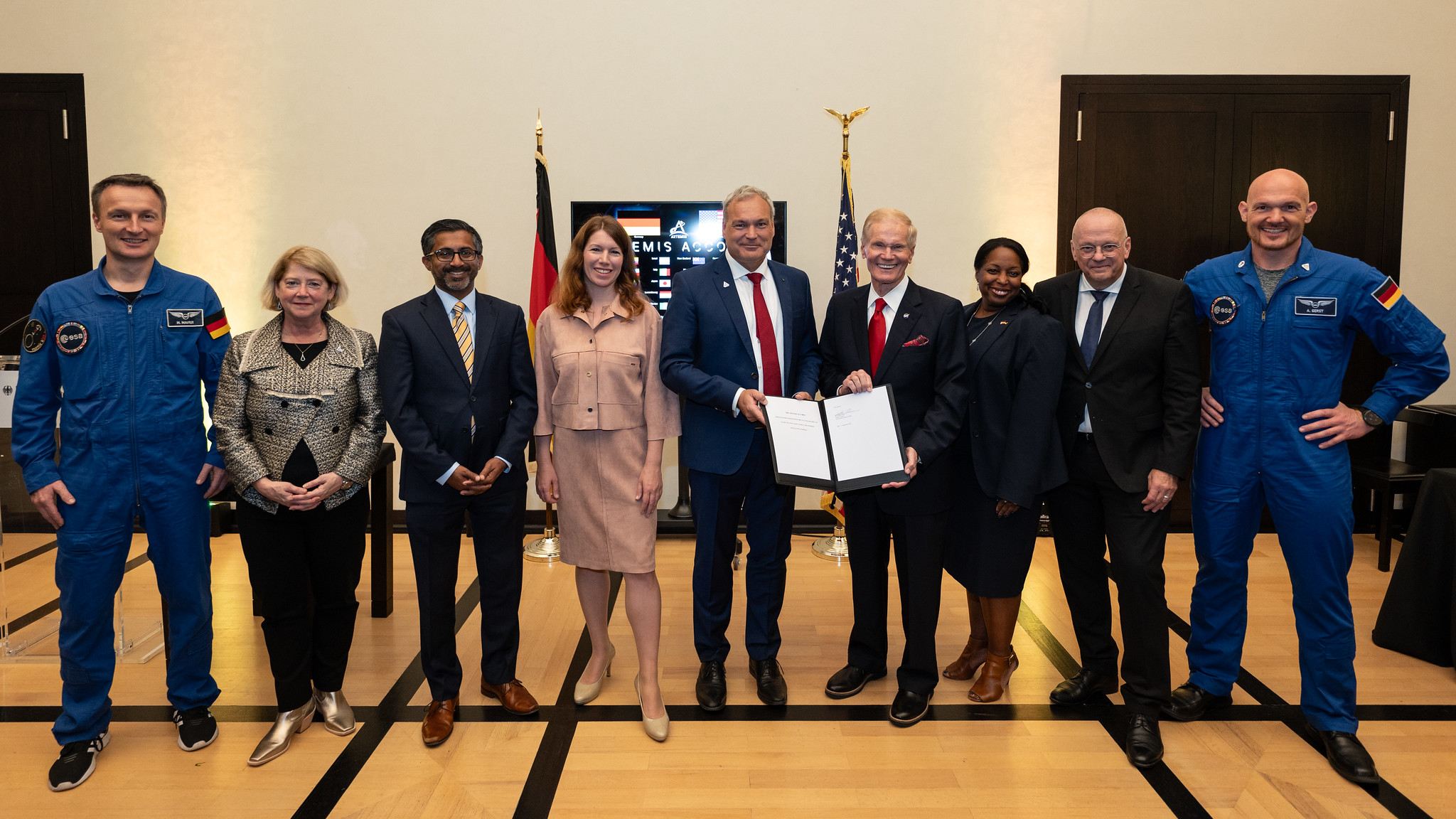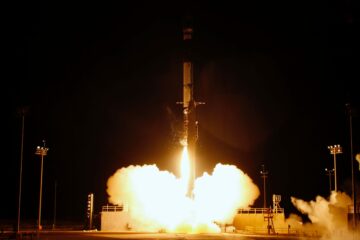
BRUSSELS — Germany signed the Artemis Accords Sept. 14, adding one of Europe’s largest space powers to a document outlining best practices for sustainable space exploration.
Germany became the 29th country to sign the accords during a ceremony at the German ambassador’s residence in Washington attended by U.S. and German officials. The document was signed by Walter Pelzer, director general for the German space agency at the German Aerospace Center, or DLR.
“Germany and the United States have been successful partners in space for a long time,” Pelzer said in a statement. “The German signing of the Artemis Accords gives a further boost to this joint endeavor to carry out programs for the exploration of space.”
NASA Administrator Bill Nelson said in a statement he was “thrilled” by the signing. “Germany has long been one of NASA’s closest and most capable international partners, and their signing today demonstrates their leadership now and into the future, a future defined by limitless possibilities in space and the promise of goodwill here on Earth.”
Germany is also one of the biggest European space nations. It committed 3.5 billion euros ($3.7 billion) to the European Space Agency at last November’s ministerial summit, more than any other member. Five of the six largest contributors to ESA — Germany, France, Italy, the United Kingdom and Spain — have now signed the accords, along with several other members.
“As a political commitment, the power of the Accords comes from the diversity and unity of its signatories,” said Mike Gold, chief growth officer at Redwire Space and a former NASA official who helped lead development of the accords. “Germany signing unifies the largest contributors to ESA and sends an unqualified message to all nations that this unprecedented coalition of countries stand united in support of a peaceful and prosperous future in space for all of humanity to enjoy.”
German officials did not publicly state why they waited until now to sign the accords. In a statement, DLR said that the accords “reaffirm” their commitment to the Outer Space Treaty and related international agreements. Backers of the accords have long argued that the document is intended to “operationalize” the Outer Space Treaty by explaining how certain principles contained in it should be carried out.
“The Outer Space Treaty is an incredible document that is as relevant today as it was in 1967. However, without the Artemis Accords, which implement the obligations of the Treaty, it’s just words on paper,” Gold said. “I’m thrilled that Germany is joining the Artemis Accords family of nations to ensure that the work of the United Nations transitions from concept to reality, creating a peaceful and prosperous future in space for all of humanity to enjoy.”
DLR added that it continued to support work to develop new binding space treaties, potentially on the issue of utilization of space resources, one of the topics covered in the Artemis Accords.
“Germany will continue to support the development of a binding international legal framework for activities on celestial bodies on the basis of the UN Outer Space Treaties, in particular as a basis for the use of space resources and for an improved exchange of information on space activities between all States Parties,” DLR stated.
Germany’s signing of the Artemis Accords comes shortly before signatories are scheduled to meet at the International Astronautical Congress in Baku, Azerbaijan, in early October. The members are expected to discuss progress by working groups studying issues regarding lunar surface operations and encouraging more emerging space nations to sign on to the accords.
- SEO Powered Content & PR Distribution. Get Amplified Today.
- PlatoData.Network Vertical Generative Ai. Empower Yourself. Access Here.
- PlatoAiStream. Web3 Intelligence. Knowledge Amplified. Access Here.
- PlatoESG. Automotive / EVs, Carbon, CleanTech, Energy, Environment, Solar, Waste Management. Access Here.
- PlatoHealth. Biotech and Clinical Trials Intelligence. Access Here.
- ChartPrime. Elevate your Trading Game with ChartPrime. Access Here.
- BlockOffsets. Modernizing Environmental Offset Ownership. Access Here.
- Source: https://spacenews.com/germany-signs-artemis-accords/
- :has
- :is
- :not
- $3
- 14
- 7
- a
- activities
- added
- adding
- Aerospace
- agency
- agreements
- All
- along
- also
- an
- and
- any
- ARE
- argued
- Artemis
- AS
- At
- backers
- Baku
- basis
- BE
- became
- been
- before
- BEST
- best practices
- between
- Biggest
- Bill
- Billion
- binding
- bodies
- boost
- by
- capable
- carried
- carry
- Center
- ceremony
- certain
- chief
- coalition
- comes
- commitment
- committed
- concept
- Congress
- contained
- continue
- continued
- contributors
- countries
- country
- covered
- Creating
- defined
- demonstrates
- develop
- Development
- DID
- Director
- discuss
- Diversity
- document
- during
- Early
- earth
- emerging
- encouraging
- endeavor
- enjoy
- ensure
- ESA
- European
- European Space Agency
- Europes
- Euros
- exchange
- expected
- explaining
- exploration
- family
- five
- For
- Former
- Framework
- France
- from
- further
- future
- General
- German
- Germany
- gives
- Gold
- Goodwill
- Group’s
- Growth
- Have
- he
- helped
- here
- How
- However
- HTTPS
- Humanity
- implement
- improved
- in
- incredible
- information
- intended
- International
- into
- issue
- issues
- IT
- Italy
- ITS
- joining
- joint
- jpg
- just
- Kingdom
- largest
- Last
- lead
- Leadership
- Legal
- legal framework
- limitless
- Long
- long time
- Lunar
- Meet
- member
- Members
- message
- mike
- more
- most
- Nasa
- Nations
- New
- now
- obligations
- october
- of
- Officer
- official
- officials
- on
- ONE
- Operations
- or
- Other
- out
- outer space
- Paper
- particular
- parties
- partners
- plato
- Plato Data Intelligence
- PlatoData
- political
- possibilities
- potentially
- power
- powers
- practices
- principles
- Programs
- Progress
- promise
- prosperous
- publicly
- Reality
- regarding
- related
- relevant
- Residence
- Resources
- s
- Said
- scheduled
- sends
- sept
- several
- Shortly
- should
- sign
- Signatories
- signed
- signing
- Signs
- SIX
- Space
- space exploration
- Spain
- stand
- State
- stated
- Statement
- States
- Studying
- successful
- Summit
- support
- Surface
- sustainable
- than
- that
- The
- The Future
- the United Kingdom
- their
- they
- this
- thrilled
- time
- to
- today
- Topics
- transitions
- u.s.
- UN
- United
- United Kingdom
- united nations
- United States
- unity
- unprecedented
- unqualified
- until
- use
- was
- washington
- which
- WHO
- why
- will
- with
- without
- words
- Work
- working
- Working Groups
- zephyrnet










